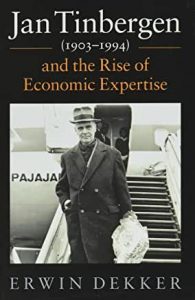This has been a busy term so I’m behind on my reading, but have recently finished a fine biography, Jan Tinbergen and the Rise of Economic Expertise by Erwin Dekker. I knew little about Tinbergen so was bound to learn a lot from any biography, and this one is genuinely interesting. It has some personal detail but is much more an intellectual history, locating Tinbergen in his historical context. That was not a happy one: the Depression and the Second World War occurred in his early adulthood. The intellectual currents were, of course, fascinating. I had never realised how much Tinbergen was engaged in policy throughout his career. As well as being the founding director of the CPB (which gave me as a thank you gift for a talk a fine bronze bust of Tinbergen earlier this year now in prominent position on my shelves), he had previously worked at the League of Nations, and continued throughout his career to be heavily engaged in policy. This followed a youth involved in idealistic progressive political movements.
To the extent economists now know anything about Tinbergen, we think of the econometric models for which his Nobel Prize was awarded. The book prompted me to read the Prize Lecture, which is very interesting: “Models constitute a framework or a skeleton and the flesh and blood will have to be added by a lot of common sense and knowledge of details.” He went on to suggest using models to compare different social orderings – communism and capitalism – on a scientific basis; it seems a forlorn hope now but evidently not in 1969. And think about the literary illustration of the equivalance of perfect markets and perfect planning in Francis Spufford’s wonderful book Red Plenty.
Dekker comments that Tinbergen found it irritating that this work from the 1930s was remembered rather than his later thinking about the institutional framework within which economies operate – the ‘Ordnung’ (the book uses the German word). I found particularly interesting a chapter titled ‘The Expert in the Model, the Economist outside the Model’, portraying Tinbergen’s effort to reconcile the fact that he had put policymakers inside his model of the how the economy operates with his simultaneous view that economists could nevertheless analyse from above – ‘the view from nowhere’ – how the system then changes and can be controlled. The chapter uses the Lucas critique to analyse this in a macro context. It’s one of the themes of my Cogs & Monsters.
I also greatly enjoyed the chapter ‘Measuring the Unmeasurable: Welfare and Justice’. Dekker writes: “Tinbergen was mostly silent on philosophical matters. …. One of the very few exceptions are his reflections on ‘measurement in the human sciences.” He saw measurements as a vector for changing behaviour, and in addition saw the purpose of economic measurement as measurement of economic welfare. His was not a positivist view, but rather a moral one: economic policy had a deep societal purpose.
The book is quite long but the 400 pages zipped by. Tinbergen was clearly a fascinating person and deserves to be better appreciated by the Anglophone dominated economics profession. This biography serves him well.

